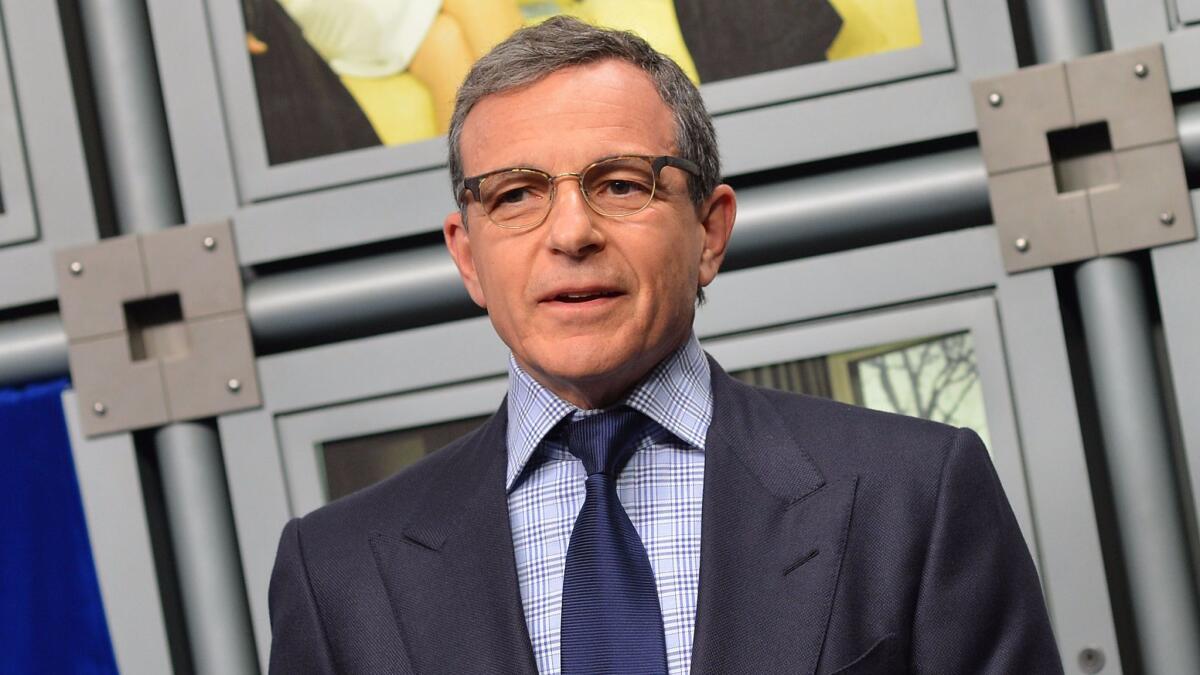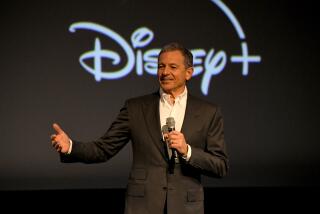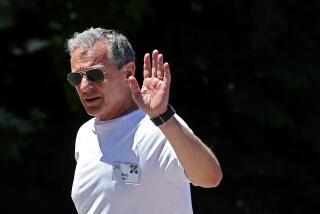As Disney’s annual meeting looms, investors hope CEO Bob Iger stays longer

- Share via
Robert Iger has been one of the most admired executives in recent Hollywood history, transforming Walt Disney Co. into a global powerhouse.
But how much longer will he remain chief executive of the $176-billion Burbank-based juggernaut?
There is a growing expectation inside and outside Disney that Iger will stay on the job longer than planned. Nearly a year after launching a search for a new chief executive, Disney’s board could soon extend his contract, which expires in June 2018, said people close to the company who were not authorized to comment.
Iger himself has signaled a willingness to stay past his existing contract, telling analysts during a recent conference call that he’d be “open” to an extension — if the board deemed that the best course of action.
The question of Iger’s future is sure to be on shareholders’ minds when they meet in Denver on Wednesday for Disney’s annual meeting. Investors will be asked to elect 11 board members and vote on shareholder proposals centered on increasing lobbying disclosures and proxy access. Disney has urged investors to reject both, according to a regulatory filing.
The issue of Iger’s contract — and who might succeed him — has been front and center among investors, many of whom welcome the prospect of Iger’s tenure as chairman and CEO continuing beyond 2018. Others, however, express concern that Disney hasn’t named a successor to guide the media conglomerate into an increasingly uncertain digital future.
“This is going to be an overhang in three months or six months if there is no movement on this — it will be the only thing people can talk about,” said Michael Alpert, portfolio manager at Stralem & Co., which owns 269,000 shares of Disney.
When Iger inked a two-year contract extension in 2014, it was expected to be his last. That deal appeared to give Disney’s board of directors ample time to find a successor. But a potential replacement, former Chief Operating Officer Thomas Staggs, stepped down in 2016, throwing the company’s succession plans into question.
Succession planning can be a delicate matter in Hollywood. And when it stalls or becomes mired in controversy, investors are prone to skittishness. At Warner Bros., a contentious battle for the company’s top job became a destabilizing distraction before Kevin Tsujihara took over as studio chief in 2013. And at Disney, the protracted handoff from former CEO Michael Eisner to Iger in 2005 is an episode the company would seek to avoid repeating.
The lack of a succession plan weighs on some analysts.
“Given the apparent difficulty of finding a replacement, and the consensus indispensability of Iger, it does beg the question of how much [future] earnings should be discounted given that there is no guarantee that an ‘adequate’ replacement will ever be found,” media analyst Doug Creutz of Cowen & Co. wrote in a Feb. 8 note.
For now, though, several corporate investors said they’d be pleased if Iger stayed longer, citing his successful track record. During his tenure, Disney has been transformed by the acquisitions of Pixar Animation Studios, Marvel Entertainment and Lucasfilm, each of which has given the company lucrative franchises.
The deals engineered by Iger, 66, are a big reason Disney’s stock price has more than quadrupled during his time as CEO. Shares of Disney closed down about a half percent to $110.67 on Monday. The stock is up more than 6% this year.
“I would be happy to have him stay on,” said Janna Sampson, co-chief investment officer of OakBrook Investments, which owns 336,300 shares of Disney stock. “It is entirely possible that he might extend a shorter amount of time … or at least stay on as a consultant in a transition period. We’d hope to see that.”
With few obvious internal candidates, the board seems increasingly likely to look outside Disney for its next leader.
Iger was unavailable for comment.
Just a few years ago, Disney appeared to have identified two possible successors: Staggs and another longtime company executive, Jay Rasulo. But Rasulo left Disney after losing the succession bake-off to Staggs in 2015. Then Staggs, who had served as chief operating officer for 15 months, stepped down from the No. 2 role last year after Disney’s board did not express confidence in his ability to lead the company.
Iger, meanwhile, seemed to have lined up a potential next act for himself in 2015, when he joined an effort by the San Diego Chargers and Oakland Raiders to build a football stadium in Carson. Iger was named nonexecutive chairman of the teams’ joint venture and was given an option to buy a minority stake in one of the two franchises. But last year, NFL owners voted to allow the Rams franchise to move to Inglewood, scuttling Iger’s plans.
Iger’s name also has been bandied about in the political realm as a potential candidate for a major office, but he has not announced his intention to pursue this path.
“I think Bob loves the company so much, that it may be difficult for him to leave it,” said Jim Cora, the former chairman of Disneyland International, who left the company in 2001.
For months, Iger had been firm in saying that he expected to depart Disney when his contract expires in 2018. However, that changed during a February call with analysts to discuss Disney’s fiscal first-quarter earnings. “While I am confident that my successor is going to be chosen on a timely basis and chosen well, if it is in the best interest of the company for me to extend my term, I am open to that,” he said.
Replacing Iger will be tough in part because of the job description. Disney has a unique culture and far flung businesses — from superhero movies to cruise ships — that any future CEO would have to fully grasp.
Also, the top job demands deft management of several successful executives — among them Alan Horn at Walt Disney Studios, Kevin Feige at Marvel Studios, Kathleen Kennedy at Lucasfilm and John Lasseter at Pixar — who’ve benefited from the sort of autonomy that a strong leader such as Iger can comfortably grant.
The company’s next CEO would inherit a largely different set of challenges from those Iger has tackled. In particular, major changes are afoot in the television business.
Disney’s cable television business has been hurt by cord-cutting and the slimmed-down TV packages offered by service providers. ESPN, the crown jewel of Disney’s TV unit, has lost more than 9 million subscribers since 2013, according to Nielsen data, and on Monday confirmed plans to lay off an unspecified number of on-air personalities. Recently, Disney has made moves designed to strengthen its media operation, including a $1-billion investment last year in video streaming company BamTech.
“You probably need someone who is more new-media oriented, so it probably needs to be somebody outside the company,” Alpert of Stralem & Co. said. “It’s not just the cable business, theme parks business anymore. Somebody has to have a grip on that.”
Still, many shareholders remain unfazed. Investor Jeff Krumpelman, managing director of RiverPoint Capital Management, said that Iger’s “openness” to extending his contract is a key factor that “instills confidence” in the company. “I have not sweat a lot about management and the timeline for Iger,” said Krumpelman, whose company owns 232,700 shares of Disney.
But some investors said that the issue of succession could soon become a distraction if Disney doesn’t offer any clarity on the issue in the coming months.
“We have a little bit of time,” Sampson of OakBrook Investments said. “If we get 12 months out from [Iger’s expected departure date] and we don’t know anything, then we will start to get concerned.”
Los Angeles Times Staff Writer Meg James contributed to this report.
More to Read
Inside the business of entertainment
The Wide Shot brings you news, analysis and insights on everything from streaming wars to production — and what it all means for the future.
You may occasionally receive promotional content from the Los Angeles Times.











